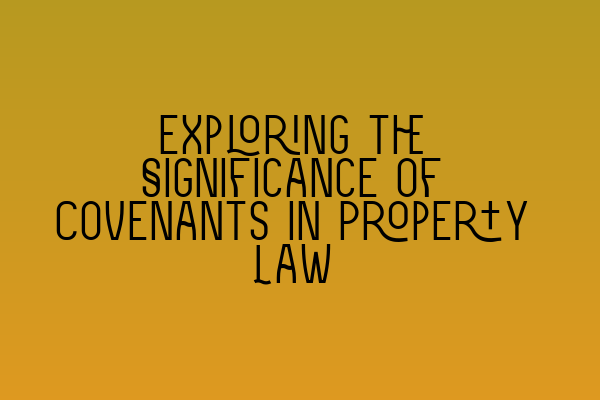Exploring the Significance of Covenants in Property Law
When dealing with property transactions, it is essential to understand the significance of covenants. Covenants play a crucial role in property law, governing the rights and obligations of property owners. Whether you are a property investor, buyer, or seller, having a comprehensive understanding of covenants can help you navigate the legal landscape with confidence.
So, what exactly are covenants in property law? A covenant is a legally binding agreement between parties that outlines certain rights and obligations related to the property. These agreements can be found in a variety of contexts, such as lease agreements, transfer deeds, and property development agreements.
The Types of Covenants
There are two main types of covenants: positive covenants and restrictive covenants.
Positive Covenants
Positive covenants require the property owner to take specific actions or perform certain obligations. These obligations can include maintaining the property in good condition, paying certain fees or charges, or granting access to specific services. Positive covenants are often found in lease agreements or development contracts.
Understanding positive covenants is essential for property investors or landlords who wish to ensure that their tenants uphold their obligations. Additionally, buyers should be aware of any positive covenants they are agreeing to when purchasing a property, as these obligations may carry financial implications.
Restrictive Covenants
On the other hand, restrictive covenants place limitations on what can be done with the property. These limitations can include restrictions on building height, use of the property, or even restrictions on certain activities, such as running a business from the premises. Restrictive covenants are often found in transfer deeds or property development agreements to protect the interests of the community or surrounding property owners.
Buyers should be cautious of any restrictive covenants that may affect the intended use of the property. It is crucial to carefully review the terms of any restrictive covenants before committing to a property purchase.
Enforcement and Remedies
One of the critical aspects of covenants in property law is their enforceability. Both positive and restrictive covenants can be enforced against the parties involved. If a party fails to uphold their obligations, the other party may seek legal remedies to enforce the covenant.
Enforcement of covenants can be done through various means, such as seeking a court injunction to stop a party from breaching the covenant, claiming damages for any losses incurred, or seeking specific performance, which is a court order requiring the party to fulfill their obligations.
Implications for Property Transactions
Covenants have significant implications for property transactions. When buying or selling a property, it is essential to consider the covenants attached to the property. Buyers should conduct thorough due diligence to identify any obligations or restrictions that may impact their intended use of the property.
Sellers, on the other hand, should ensure that all covenants are appropriately disclosed to potential buyers. Failing to disclose covenants may result in legal action and potential financial losses.
In addition to buyers and sellers, property developers should also pay close attention to covenants. Before initiating any development projects, developers must consider any restrictive covenants in place that may affect the proposed development plans.
Conclusion
Covenants are a fundamental aspect of property law, shaping the rights and obligations of property owners. Understanding the different types of covenants and their implications is crucial for anyone involved in property transactions. Whether you are a buyer, seller, or property developer, navigating covenants requires careful consideration and due diligence.
If you have any questions or need assistance with property-related legal matters, please do not hesitate to get in touch with our expert team at SQE Property Law & Land Law. We specialize in providing professional legal advice and guidance to ensure smooth property transactions. Reach out to us today!
Related Articles:
